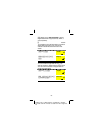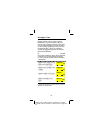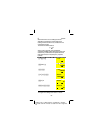
30
Ti36eng1.doc TI-36X II Manual Linda Bower Revised:
01/10/03 10:47 AM Printed: 01/10/03 10:47 AM Page 30 of
48
Integrals
The TI-36X
ü
performs numerical integration using
Simpson’s Rule. To prepare for an integral, store the
lower limit in memory variable
A
, the upper limit in
memory
B
, and the number of intervals (from 1 to 99) in
memory
C
. Press
0
and enter the expression, using
memory variable
A
as the independent variable. Then
press
V
. While the calculator is processing the
data,
µ
CALC
displays. When the calculation is
successfully completed, the TI-36X
ü
will return the
numerical value to the result line. In addition, the
calculator will clear memory variable
C
;
A
and
B
will be
equal to the upper limit. If
A
>
B
, or if
C
is not an integer
1-99, or if
A
,
B
, or
C
is undefined,
Integrate Error
will
display, and
A
,
B
, and
C
will be cleared.
If you want to solve a given problem again using a
different number of intervals or different limits, enter
values to store in memory variables
A
,
B
, and
C
. Then
scroll to the integration problem in history and press
V
; the calculator will solve the same problem with
the new data.
The time the calculator takes to solve the problem
depends on the complexity of the problem and the
number of intervals. You can abort the calculation by
pressing and holding
T
until
Integrate Error
is
displayed.
With polynomials up to the third degree, Simpson’s rule
yields the exact answer, so increasing the number of
intervals will not change the results. However, with
polynomials of higher degree and equations containing
more complicated functions (such as trigonometry),
increasing the number of intervals will improve the
precision of the results.
Note
: When you perform integration with trigonometric
functions, the calculator must be in
radian
mode.


















